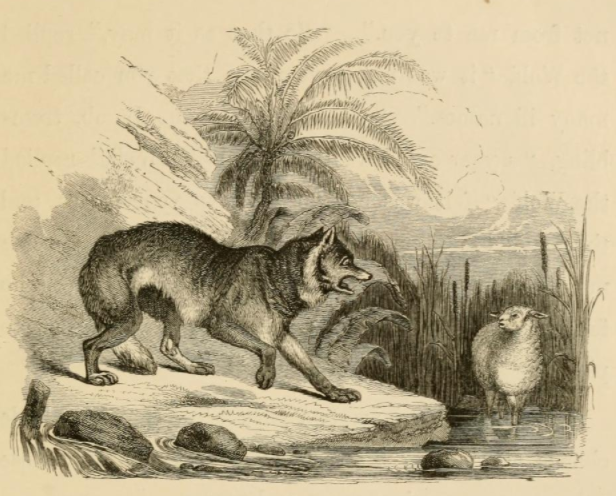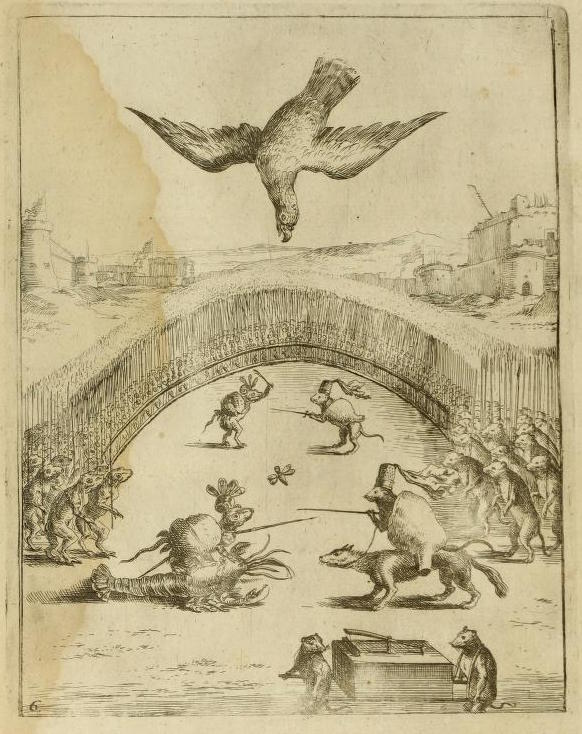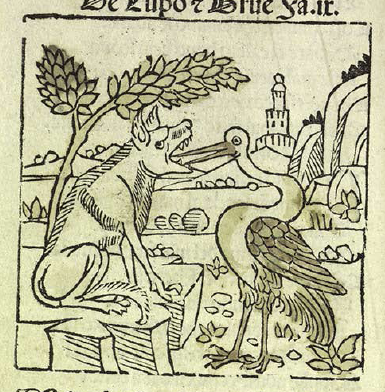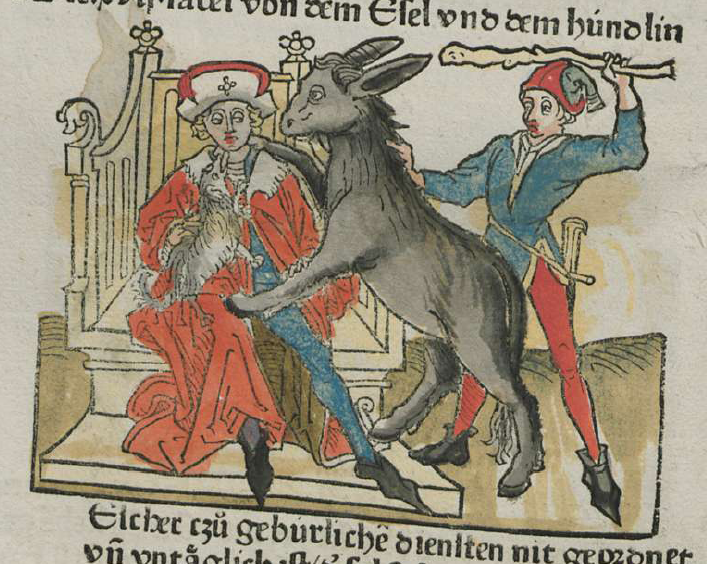Of the Wolf and the Lamb (Latin)
A Wolf, drinking at a spring-head, saw a Lamb drinking a great way below. He ran to it, and chid the Lamb; because it muddied the Spring. The Lamb trembled, and humbly besought him, that he would spare an innocent. Saying, that he, because he drank a great way below, could not indeed muddy the Wave's drink. much less would he. The Wolf rails aloud on the contrary: Thou varlet, thou hadst as good do nothing: thou art always opposing me; thy fire, thy dam, and all thy kind whom I cannot abide to see, do what thy can to cross me. I will punish thee to day.
It is an old saying. It is an easie thing to find a stick to beat a dog with.
Of the Mouse and the Frog (Latin)
A Mouse made war with a Frog. They fought for the command of the Fen. The fight was eager and hazardous. The crafty Mouse, lurking under the grass, sets upon the Frog by ambuscado. The Frog being the lustier, being big-breasted and a good leaper dares his enemy to plain fight. They had each of them a pike made of a Bull-rush. Which conflict being soon a far off, the Kite makes haste, and whilst for eagerness of fighting, neither looks to himself, the Kite snatcheth and pulleth in peices both the warriours.
Of the Wolf and the Crane (Latin)
The bones by chance stuck in the throat of a Wolf, that had worried a Sheep. He goeth about, he intreateth help, but no body helpeth him. Every body said, He was rightly serv'd for his greediness. At the last, he perswadeth the Crane with many fair words, and more promises; that with her great long neck, being put into his throat, she would take out the bone that stuck in it. But he mockt her, when she desir'd something for her pains; Thou fool (quoth he) go thy way, hast thou not enough that thou livest? Thou art beholding to me for thy life. If I had listed, I might have bit off thy neck.
It is an old saying, that it is thrown away, which thou dost to an ungrateful person.
Of the Country-Man and the Snake (Latin)
A Country-man brought home a Snake which he had found in the Snow almost starved to death and laid it before the fire. The Snake recovering strength and poison from the fire, and afterwards not abiding the heat, filled all the Cottage with hissing. The Country-man, having got up an Hedge-stake, runs to him, and takes him up roundly for the wrong done him, both with words and strokes. Would he thus requite him? Would he offer to take away his life that had given him life?
It sometimes comes to pass, that they do thee hurt, whom thou hast done good to; and deserve ill at thy hands, from whom thou hast well deserv'd.
Of the Dog and the Ass (Latin)
Whilst the Dog fawned upon the Master and the Family, the Master and the Family cherished the Dog. The little Ass seeing that, fetched a deep sigh; it begun to irk him of his condition: He thought it was not fairly carried, that the Dog should be welcom to all, and be fed at his Master's Table and get that by idleness and play: and that he on the contrary, should bear pack-saddles, should be beaten with a whip, should never be out of work; and yet be hated of every body. If these things were done with fawning, he resolved to follow that trade which was so profitable. Therefore to try the matter, he runs to meet his Master one time, as he was coming home again; he leaps upon him and knocks him with his hoofs. When the Master cryed out, the servants ran to him; and the foolish Ass that thought he was mannerly, was beaten with a cudgel.





No comments:
Post a Comment
Comments are limited to Google accounts. You can also email me at laurakgibbs@gmail.com or find me at Twitter, @OnlineCrsLady.